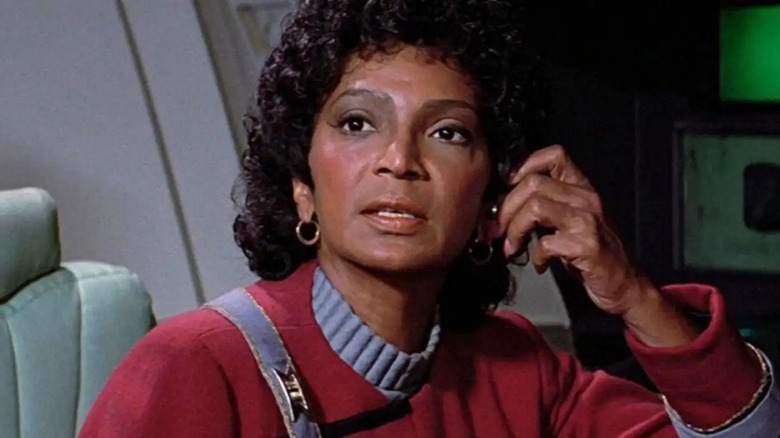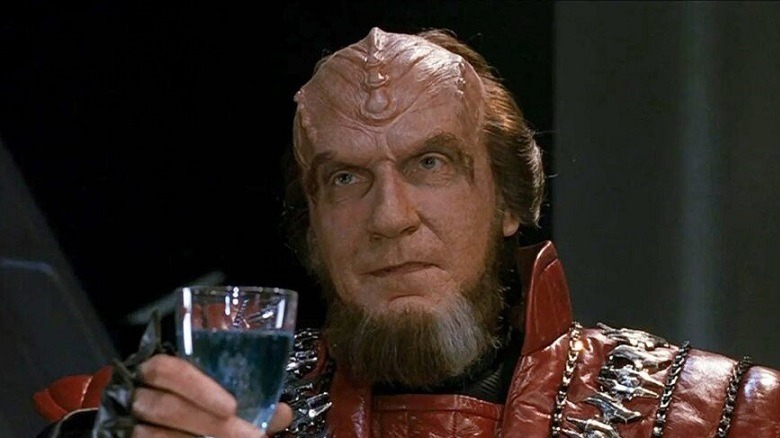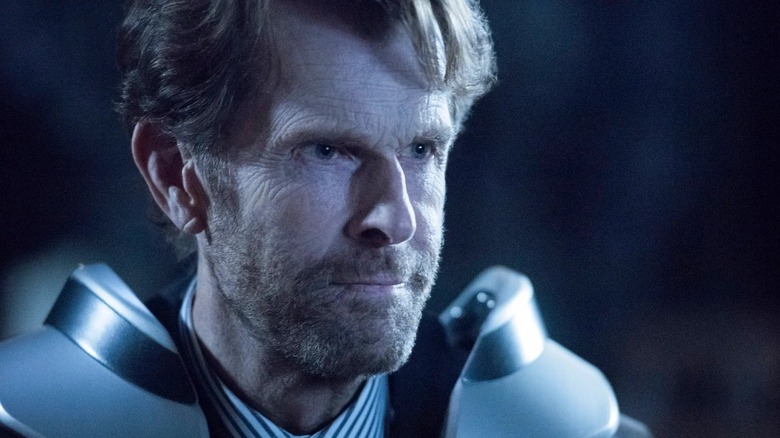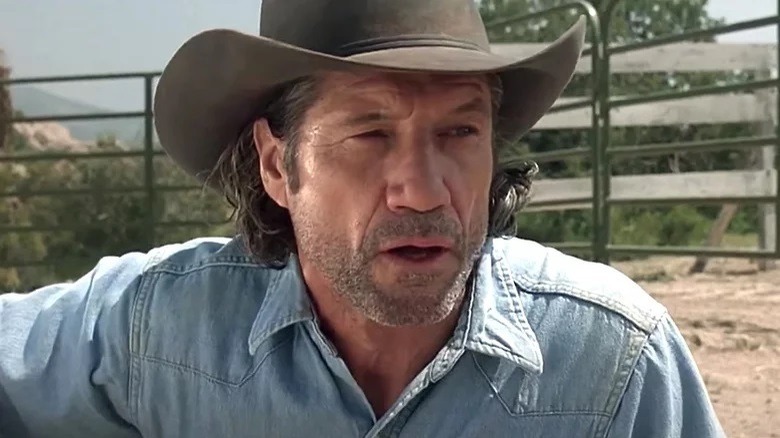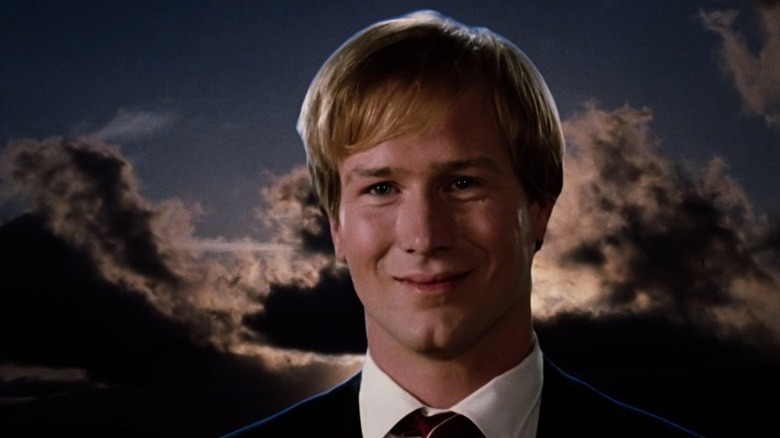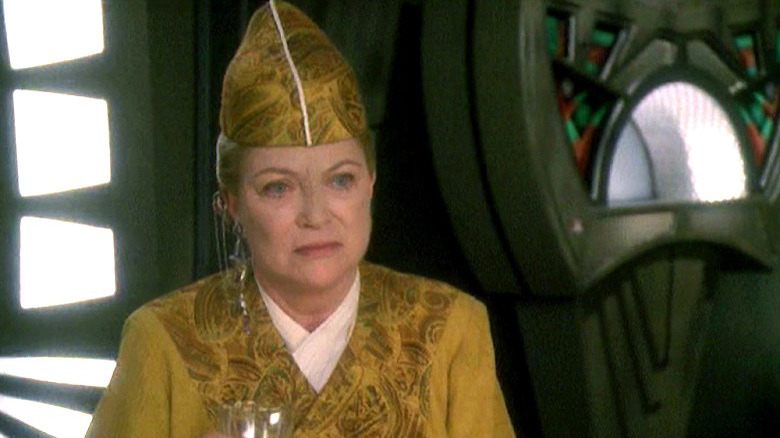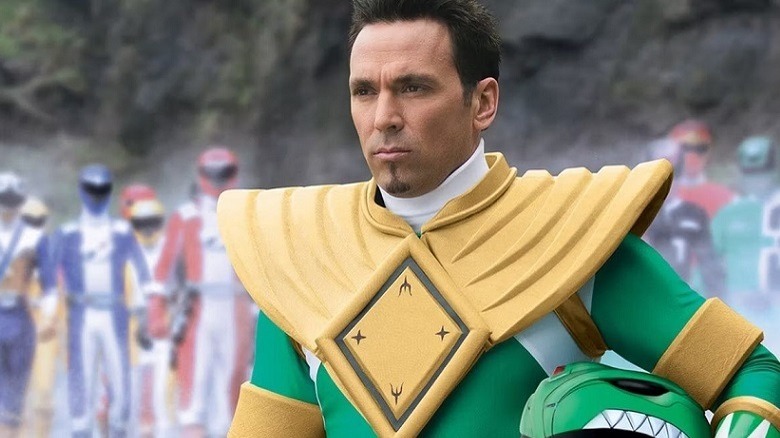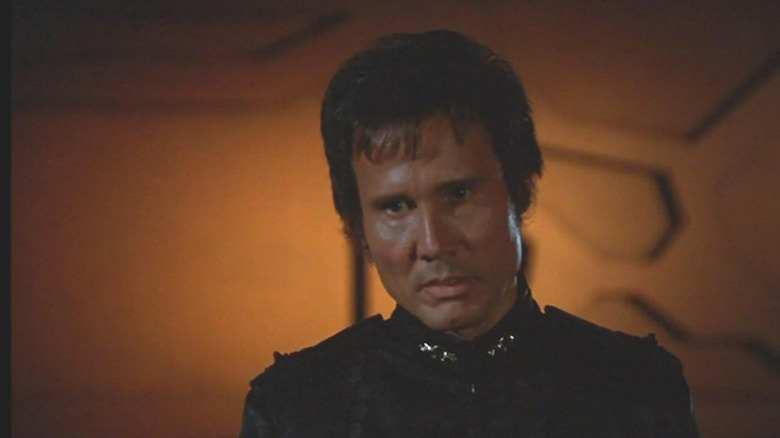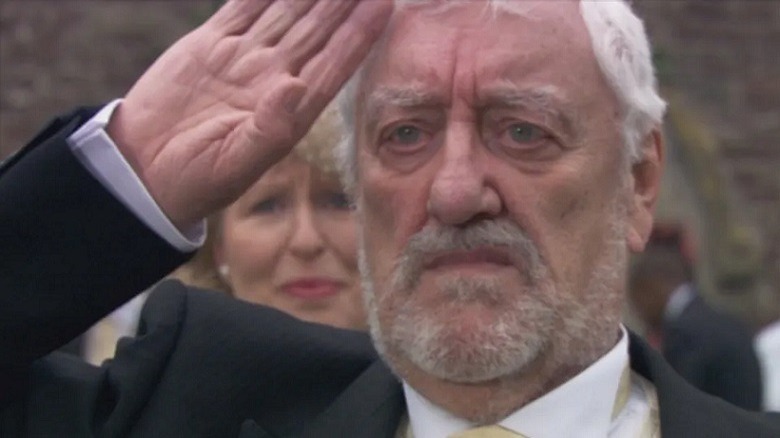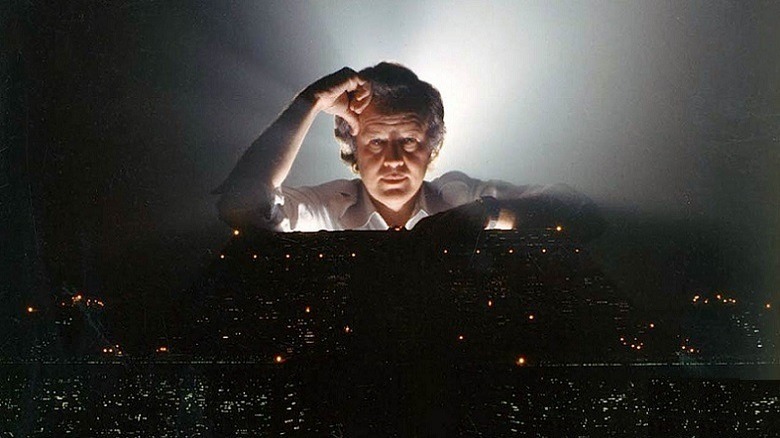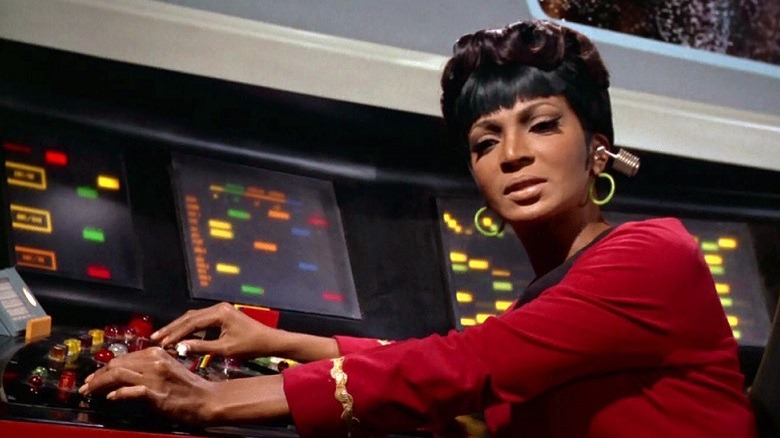Sci-Fi Stars Who Sadly Passed Away In 2022
2022 has been a tough year for science fiction fans, with a formidable array of talent having left us. From stalwart character actors who seemed like they'd always be with us to a voice talent who provided the definitive characterization of one of the most well-known fictional characters on the planet, the galaxies of speculative fiction are poorer for their absence.
Notably, it was the year in which we lost the Greek composer Vangelis, whose sprawling soundscapes in Blade Runner were as much a part of the film as the visual effects created by another sad inclusion on this list, and also, actor James Caan, whose brief foray into science fiction included memorable roles in "Alien Nation" and the dark satire "Rollerball."
This article will cover the science fiction stars who died in 2022. Their talents may be lost to us, but they'll forever retain their position amongst the stars — where they belong.
David Warner
Born in Manchester, England, in 1941 and having cut his teeth in theatre, David Hattersley Warner was an omnipresent face in genre television and cinema throughout the 1970s and beyond. Taking advantage of Hollywood's penchant for casting Brits as villains, Warner used his formidable persona to significant effect in roles such as Sark in 1982's "Tron" and Evil in Terry Gilliam's 1981 masterpiece "Time Bandits."
There were few franchises that Warner did not grace with his presence. He made several appearances in "Doctor Who" and its spin-offs. He eventually made his way to the most successful science fiction TV franchise of all time.
With a rare talent for edifying even non-starring roles with a level of gravitas as both St. John Talbot and Chancellor Gorkon in "Star Trek V: The Final Frontier" and "Star Trek VI: The Undiscovered Country," It was his portrayal of the callous Cardassian Gul Madred in the classic "Star Trek: The Next Generation" episode "Chain of Command" where he would leave his indelible mark.
With echoes of the sinister interrogator in George Orwell's "1984," Madred's scenes in which he mentally and physically tortures a beleaguered Captain Picard (Patrick Stewart) are among the most memorable of the entire series. With every scene the two share being a veritable acting masterclass, Warner's performance is as convincing as it is chilling. You'll almost believe that there are five lights yourself. Regardless of the actual number, one bright talented star faded from the acting firmament when Warner died from a cancer-related illness at 80.
Kevin Conroy
Kevin Conroy is the voice that you hear in your head every time you think of Batman. The New York-born actor voiced the Caped Crusader in dozens of animated movies, TV series, and even a rare foray into live-action, but it was 1992's "Batman: The Animated Series" that saw (or rather, heard) his debut as the Chiroptera-themed Crimefighter.
Conroy was a Juilliard-trained actor capable of bringing playful warmth with a hint of duplicitousness and mystery to flirtatious playboy Bruce Wayne and an imposing and threatening gravitas to his vigilante alter-ego. Just as Adam West was the definitive voice of the character in the Silver Age, Conroy's vocal talents defined the character in the modern age.
Shortly before his death, he wrote a short story for the "DC Pride 2022" anthology. Titled "Finding Batman," it relates the trials and tribulations of being a gay actor trying to find his feet in Hollywood, culminating with a peek into the events and energies that led to him discovering the inner (and outer) voice of the Batman.
Sadly, Conroy died after a short battle with cancer at the age of 56, leaving behind his husband, Vaughn C. Williams. The Bat-Universe will never be the same without the imposing gravelly tones of the Dark Knight, but he leaves behind a lofty legacy and a huge body of work.
Fred Ward
Craggy-faced San Diegan Fred Ward was equally at home in B-movies and major productions and is best known to genre audiences for his portrayals of Gus Grissom in Philip Kaufman's "The Right Stuff" and the hapless Earl in of the "Tremors" franchise.
Based on Tom Wolfe's novel of the same name, "The Right Stuff" is the true story of Project Mercury, the first American attempt at human spaceflight. The cast is a veritable who's who of acting talent, and Ward's portrayal of one of the first men to fly into space twice is a standout. The film and novel are not without controversy. Grissom was involved in an incident in which NASA cleared him. However, "The Right Stuff" indicates Grissom's guilt. Ward's portrayal shows him as a genuine and authentic character, albeit not a man without flaws.
Ward died at the age of 79. The cause of death has not been revealed, but Ward had asked for memorial donations to be made towards the study of the brain disease known as traumatic encephalopathy. Fellow actor Kevin Bacon spoke fondly of their working relationship on the "Tremors" movies, citing their mutual love of jazz and Django Reinhardt. Indeed, Ward was such a fan of the Belgian composer and guitarist that he named his son after the jazz legend.
William Hurt
Modern audiences may have been introduced to William Hurt through his portrayal of Lt. General Thaddeus Ross in a lengthy span of Marvel Cinematic Universe offerings (beginning with "The Incredible Hulk"), but that pales compared to the four-decade body of work that this Juilliard trained Academy Award-winning actor left behind.
Eclipsed by "The Matrix," which dealt with similar themes, albeit on a larger and more bombastic Hollywood scale, Alex Proyas' 1998 movie, "Dark City," never got the recognition it deserved. That said, the reality-bending sci-fi noir is a classic — largely because of its convincing central performances, especially that of William Hurt as Inspector Frank Bumstead.
Hurt explored the worlds of cerebral science fiction two decades earlier in 1980's "Altered States." Ken Russell's exploration of the inner self is a particularly high-concept film, which could have been made or broken by the strength of the performances in it. It's a testament to Hurt's immense talent that his performance as fanatical Professor Edward Jessup remains grounded and believable, a central anchor to a plotline that entails a lot of suspension of belief. Hurt elevates the already lofty material from Paddy Chayefsky's novel, which is why the film remains a science fiction classic.
Hurt died at the age of 71 from complications of prostate cancer.
Louise Fletcher
Louise Fletcher is instantly recognizable as the tyrannical Nurse Ratched from 1975's "One Flew Over the Cuckoo's Nest," for which she earned an Academy Award for best actress in a leading role. However, she also had an impressive résumé of television and movie work.
In 1993 she brought her considerable acting talent to the "Star Trek" franchise, appearing as antagonist Winn Adami across all seven seasons of "Deep Space Nine." Imparting the belligerent Bajoran with the same loathsomeness that made Mildred Ratched so deliciously compelling, her 14 appearances meant the character was given a proper story arc. It's plain to see that Fletcher relished every moment in the role. Villains rarely have much screen time, so it was a boon to have secured Fletcher's considerable talents for so long.
Fletcher will probably be best remembered for her villainous roles (her portrayal of Mrs. McKeltch in Tobe Hooper's 1986 science fiction B movie tribute "Invaders from Mars" is a particular highlight), and her impressive talents made for a particularly nuanced antagonist in "Deep Space Nine" that was as worthy as anything in her oeuvre.
Fletcher died of natural causes in her home in France at 88.
Jason David Frank
It seems like there are as many iterations of the "Power Rangers" television series as there are variants of the "Streetfighter" video game series or stars in the sky. However, Tommy Oliver, played by Jason David Frank, was a reliable constant. A multi-disciplined martial artist and actor, there were few colors from the Power Ranger costume spectrum he hadn't donned until he officially retired from the franchise in August 2022.
Originally cast as the Green Ranger (created by villainess Rita Repulsa as an evil Power Ranger) in the first season in 1993, Frank soon joined (and went on to lead) the main team. Although his character was only meant to last for 12 episodes, his popularity saw him return and remain a part of the franchise up until very recently, and he even made a cameo appearance in the 2017 movie.
Adapted from the 1975 Japanese series "Super Sentai," the long-running (and ever-mutating) series may have been as camp as they come and preposterously daft, but it wore its influences on its sleeve and remained as entertaining and as watchable as ever. It was science fiction as pantomime and bore that responsibility proudly.
A dedicated Christian, Frank died at the age of 49. His wife revealed that he'd been suffering from mental health issues, and he sadly took his own life.
If you or anyone you know is having suicidal thoughts, please call the National Suicide Prevention Lifeline by dialing 988 or by calling 1-800-273-TALK (8255).
Henry Silva
As a result of his swarthy looks, chiseled cheekbones, and piercing eyes, Henry Silva was frequently cast as a villain. He carved out a substantial career playing mobsters, murderers, and thieves. No stranger to genre television, Silva made dozens of appearances in the sci-fi anthology series "The Outer Limits," Irwin Allen's "Voyage to the Bottom of the Sea," and Rod Serling's "Night Gallery." In 1979, he made a foray into science fiction feature films.
"Buck Rogers in the 25th Century" was based on the original comic strip that debuted in 1929 and the movie serials from a decade later. Starring Gil Gerard as the eponymous hero, Silva was cast as the villainous Killer Kane. Silva was recast in the spin-off TV series that followed, but he brought elegance and depth to the evil mastermind. Ostentatious and callous, Silva was a memorable foil for our hero, and his performance is one of the strongest in the movie.
Silva also lent his distinctive voice to animation, voicing the supervillain Bane in both "Batman: The Animated Series" and the 1996 "Superman" animated series.
Silva died nine days shy of his 96th birthday at a retirement community in Los Angeles.
Bernard Cribbins
When a fresh-faced Bernard Cribbins portrayed the Doctor's companion Tom Campbell in 1966's "Daleks' Invasion Earth 2150 A.D.," no one would have suspected he'd reappear in the franchise half a century later, albeit in another guise as Wilfred Mott. Older viewers remember Cribbins for his extensive work in children's television, but a new audience would discover him as the loveable grandfather of Donna Noble (Catherine Tate).
To Brits of a certain age, Cribbins was the voice of their childhood. From his frequent appearances on "Jackanory" (a show in which celebrities or household names read classic or contemporary children's stories) to his voiceovers on "The Wombles" and "The Wind in the Willows," he was an omnipresent force. It was a delight for those who had grown up with both Cribbins and "Doctor Who" to see him appear as a new character in the Christmas episode "Voyage of the Damned." Although he was never an official companion, he's the only actor to have played two different colleagues of the Doctor. We're yet to see Cribbins' last performance as Wilfred Mott, as the actor filmed some scenes for 2023's 60th anniversary of "Doctor Who." Sadly, the actor died at the age of 93.
Douglas Trumbull
From the ultra-convincing authenticity of "2001: A Space Odyssey" to the awe and majesty of the extra-terrestrial illuminations of "Close Encounters of the Third Kind," visionary special effects pioneer Douglas Trumbull brought the worlds of speculative fiction to life. The towering industrial vistas of Blade Runner so often imitated as the basis for countless science fiction cities, would not have existed without Trumbull's experimental and ground-breaking work.
Trumbull directed the avant-garde ecological masterpiece "Silent Running," but his directing career drew to a close after the sad death of actor Natalie Wood during the making of "Brainstorm." He would return 20 years later as a visual effects consultant to an industry in which CGI had largely replaced the practical effects he had pioneered. Modern special effects supervisors indeed stand on the shoulders of giants such as Trumbull.
After a stroke and a bout of cancer, complications from those conditions led to his death from mesothelioma at 79. His ashes are due to be launched into space (along with those of Nichelle Nichols) at some point in the future.
Nichelle Nichols
It's easy to forget how groundbreaking "Star Trek" was when it launched in 1966. Featuring a spacecraft with a Russian on the bridge crew when the United States was engaged in the Cold War, an Asian crew member when memories of the various wars in the Pacific were still fresh, and a Black female lieutenant when the country was in the throes of race riots, "Star Trek" took a bold stance.
Trained as a singer and dancer, Nichelle Nichols got her TV break when she guested on Gene Roddenberry's military drama "The Lieutenant." Roddenberry would then give her the life-changing (and lifelong) role of Nyota Uhura for his proposed "Wagon Train to the Stars." After a single season, she was tempted to leave, feeling her character was underdeveloped. However, civil rights icon Martin Luther King Jr. encouraged her to stay, reminding her of the importance of her character as a role model for Black Americans. Nichols would go on to guest star in many TV shows after "Star Trek" ended in 1969, but she would return as Uhura in the animated series, movies, and various video-game spin-offs.
There's no denying how important she was in defining strong female roles — something "Star Trek" has carried the torch for since its inception — and how inspirational she was in her work for NASA, encouraging people of color to join the space program. Nichols died at 89 in New Mexico of heart failure.
